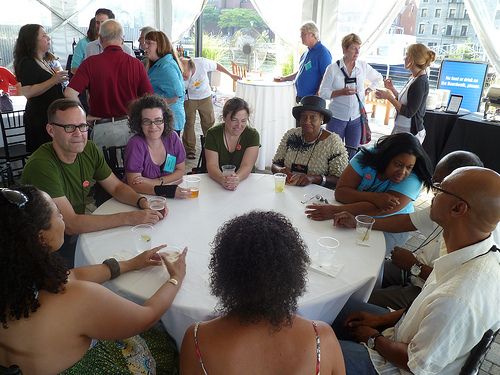- About
- Programs
- Issues
- Academic Freedom
- Political Attacks on Higher Education
- Resources on Collective Bargaining
- Shared Governance
- Campus Protests
- Faculty Compensation
- Racial Justice
- Diversity in Higher Ed
- Financial Crisis
- Privatization and OPMs
- Contingent Faculty Positions
- Tenure
- Workplace Issues
- Gender and Sexuality in Higher Ed
- Targeted Harassment
- Intellectual Property & Copyright
- Civility
- The Family and Medical Leave Act
- Pregnancy in the Academy
- Publications
- Data
- News
- Membership
- Chapters
Summer Institute

About two hundred faculty members and other higher education professionals gathered at Suffolk University in Boston in July for the AAUP Summer Institute, cosponsored by the AAUP’s Collective Bargaining Congress and Assembly of State Conferences. The institute is geared toward both unionized and nonunionized faculty activists at all types of institutions. Offerings included workshops on effective shared governance, faculty handbooks, organizing, communications, government relations, advocacy, and contract negotiations, plus a four-part series on how to conduct a financial analysis of your institution.
“I’m from a small private university, and I came to the Summer Institute wondering if the AAUP still puts time and effort into fostering nonunionized advocacy chapters,” says Steve Chase of Antioch University New England. “The two-part workshop on creating strong employee handbooks was led by three national AAUP staffers who made their presentations relevant to both collective bargaining and advocacy chapters. And I was very impressed with the quality of my last workshop, ‘Building, Strengthening, and Maintaining an Effective Advocacy Chapter.’ I’ve only been back on campus a few days, but I’m already recruiting other people to work with me to organize a vibrant advocacy chapter here.”
In addition to workshops, the institute featured social events—including a performance by the University of Rhode Island’s Cognitive Dissidents and dinner at the New England Aquarium—and opportunities for casual networking. “I attended several workshops and made invaluable connections to other faculty organizers and leaders. I walked out of Organizing 101 with a clear plan to organize our union’s leadership,” says Luis Martín-Cabrera of the University of California, San Diego.
Martín-Cabrera says he also found the workshops on labor and diversity conducted by Kimberly King, Leslie Bryan, and Charles Toombs particularly valuable. “Our reinvigorated AAUP chapter emerged out of a coalition of antiracist faculty fighting against the budget cuts and structural racism on campus,” Martín-Cabrera says. “The connection between labor issues and diversity is key to us. I walked away from these workshops with an idea for a campaign for access and equity and specific details on how to implement it.”



